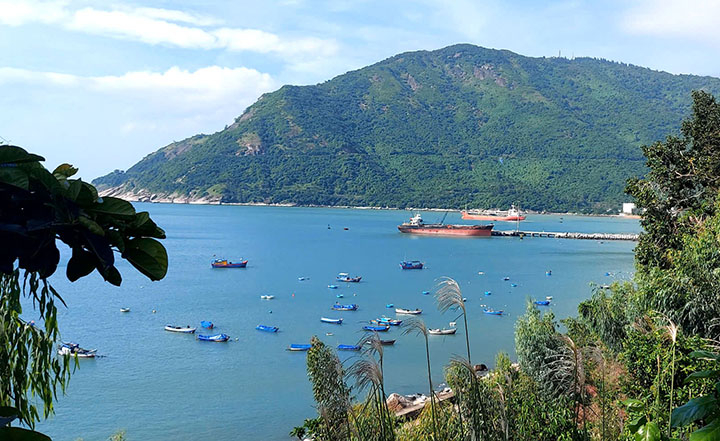
A corner of Vung Ro bay
O Ro in the past
According to the elders, the ancient name of Vung Ro was O Ro in the Cham language. But numerous people believe that because this place has trees named “ô rô”, “cóc kèn” - the type of herbaceous plant, short, round leaves, dense branches, numerous thorns from the base to the top, growing densely on the beaches, it is called O Ro.
Vung Ro bay is surrounded and sheltered on three sides by high mountains. The climate here is fresh all year round, the waves are calm, the sea is gentle.
Standing on the top of Ca pass and looking down, the deep blue Vung Ro bay appears in the middle of the vastness of the sky and earth, like a giant, blue and calm lake. The east side is Nua Islet, bordering Dai Lanh sea (Van Ninh, Khanh Hoa) blocking the wind from the sea; between Nua Isle and Yen Cape is the gateway for ships and boats.
The North-South railway runs across a part of the west at the foot of Ca pass with winding, long and short , one after another. Sitting on the train, passengers can look out through the window to admire the beauty of Vung Ro.
Before the 1990s, when Vung Ro was still wild, Vung Ro bay was only a place for seafood exploitation by local fishermen and some neighboring provinces, a place for ships to shelter from storms. In particular, during the resistance war, Vung Ro became a very important strategic location for both sides. In the years 1945 - 1954, the French considered Vung Ro as a pedal to attack and block our supply of food and weapons to the battlefields of Phu Yen, Khanh Hoa and the Central Highlands.
During the resistance war against the US, Vung Ro was the oil port leading to Dong Tac airport, where military equipment was transported to the Central battlefield of the Army of the Republic of Vietnam. And it was also at Vung Ro that 60 years ago, the Army and People of Phu Yen received the first No-number ship carrying more than 60 tons of weapons and medicine along the Ho Chi Minh Trail at sea to the wharf safely.
Vung Ro today
Vung Ro village was officially established in 1986, gathering residents from numerous different regions such as Thua Thien Hue, Quang Ngai, Khanh Hoa... and indigenous people. However, before that, there were people from Tuy Hoa who came to this "new economic zone" to reclaim land, first was Mr Chau Dinh Khang's family in Ward 6 (now Ward 4); then numerous families migrated from Hue and numerous other places. Vung Ro has become a place where numerous different cultures and customs intersect.
In the early days of the village's establishment, the lives of Vung Ro people encountered numerous difficulties, traveling mainly by sea and everything started from scratch. But since the re-establishment of Phu Yen province, this fishing village located at the foot of Ca pass has truly changed, with a miraculous transformation.
Houses have sprung up, close together on the shore of the bay, along with numerous invested works and infrastructures. That is Vung Ro seaport with a capacity of 500,000 tons of goods per year, capable of receiving liquefied gas tankers up to 250,000 DWT.
Next to it is National Highway 29 adjacent to National Highway 1 - the North-South thousand-mile road, connecting the South Central Coast with the Central Highlands. This is also the only sea transport hub in Phu Yen today, connected to Hoa Hiep Industrial Park, opening up a new vision, attracting numerous urban, tourism, industrial, and commercial service investors to Dong Hoa.
There is also a petroleum depot belonging to Phu Yen Petroleum Joint Stock Company (PV OIL Phu Yen) with a capacity of 22,700m3; a gas depot with a capacity of thousands of tons of Saigon - Phu Yen Petroleum Joint Stock Company; a representative office of Quy Nhon Maritime Port Authority, Linh Son Pagoda, a border guard station at the border gate...
According to Mr Nguyen Nhan, former Party Secretary of Vung Ro village, Vung Ro people today are not only good at exploiting and raising aquatic products but also know how to do business, trade, and provide tourism services, so their economic life is increasingly prosperous, and their spiritual life is also improved. High-income families, typically households such as Phan Van Khanh, Nguyen Van Khai, Truong Van Hung… Along with other coastal villages in the province, Vung Ro today is full of vitality on the path of renewal, for a peaceful, prosperous and happy life.
Translated by Hai Loan